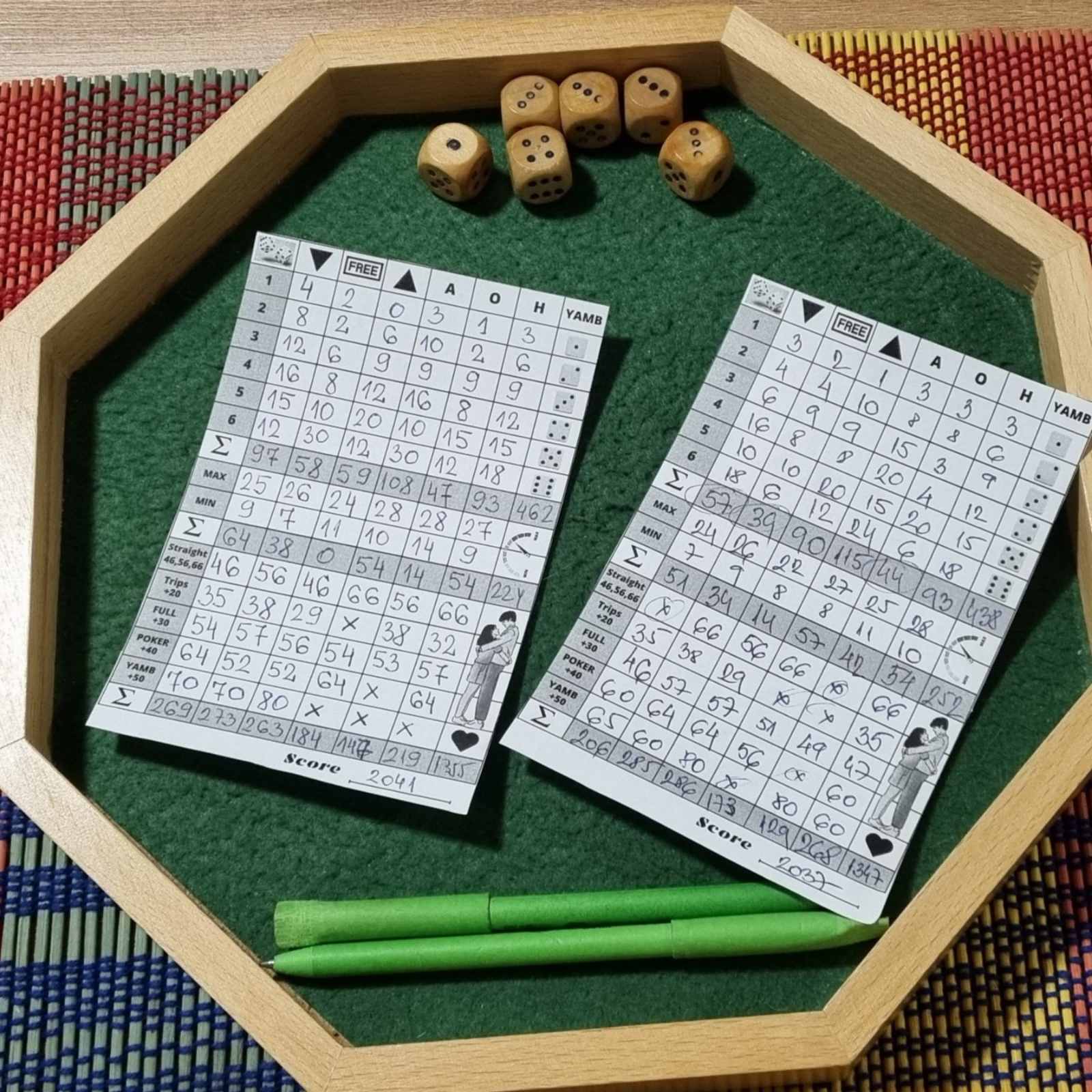
What is sustainable living? How Your Choices Shape a Sustainable Present and Future
By embracing sustainable living, we adopt practices that contribute to the well-being of the environment, society, and economy.

Do you sometimes feel worn out from the same old routine, spending every night in front of the TV? Do you crave to reconnect with your partner, family, and friends?
Well, dust off your good classic board games because there is more than one benefit of game nights! My husband and I experienced this on one cold winter night. The temperature dropped to -15 degrees Celsius, and our yard was white from snow, ice, and frost. In this not-so-cozy, nowhere-to-go fairytale, we realized we had watched all the good movies and TV shows. Suddenly, I remembered my favorite high school dice game called Yamb. I dug up six dice and a Yamb scorebook, which I moved from my apartment to my new house :), and the fun started. This game is like a sibling to Yahtzee but more brainteasing since, besides pure luck, you need a good strategy as well. Since that night, we developed a Yamb addiction.
Let's observe ten health benefits of playing traditional board games according to experts:
Board games provide a unique form of entertainment that allows you to unwind and enjoy the moment. The relaxed atmosphere can be a breeding ground for inspiration. Board games offer a laid-back setting where creative ideas can naturally emerge. What is creativity? Creativity is our ability to develop applicable and original ideas. Being creative is super important nowadays. It's not just for artists; even jobs like being a manager need creativity. So, it's necessary to find ways to grow your creative skills. Many board games involve solving problems and making strategic decisions. These challenges stimulate your brain and enhance your problem-solving skills. So, playing these types of classic board games, you're essentially giving your creativity a workout.
Endorphins are like superheroes to your body, swooping in to save the day when you need a mood lift or pain relief. These tiny powerhouses are neurotransmitters produced by the brain and the central nervous system, and they play a crucial role in making you feel good. Your body produces this hormone during pleasurable activities. Endorphins are not just mood boosters; they are also natural painkillers. In discomfort or pain, your body releases endorphins to numb the pain. This mechanism is often activated during intense exercise, providing a temporary shield against pain and contributing to euphoria after a good workout.
Enjoyable activities stimulate endorphin release, such as meditation, dancing, laughing, romancing, or engaging in board games you enjoy. In other words, classic board games can help reduce stress levels and promote a sense of calm.

This fascinating connection between retro board games, laughter, and endorphins isn't merely about a good time; it extends its benefits to our physiological well-being, especially blood pressure.
Now, here's where the magic happens concerning blood pressure. Endorphins, in addition to their mood-enhancing qualities, play a role in promoting overall cardiovascular health. They contribute to the dilation of blood vessels, facilitating improved blood flow. This physiological response can help in maintaining or even lowering blood pressure levels.
In our busy world, it's important to take breaks and relax. Playing board games is a fantastic way to have fun and chill out. Laughing and feeling happy while playing also improves our well-being. So, next time you play a classic board game, know you're not just having fun – you're giving your heart a little break, too!
In recent years, research has shown that our immune system and emotions are somehow companions. They work together to handle all the changes around us. When these systems stay balanced, they can help protect our bodies. Yet, this protective mechanism poses a disadvantage when the systems aren't balanced. A new field of research emerged called affective immunology.
Affective immunology is a framework of study based on two essential assumptions:
Board games bring joy and positive emotions into our lives. Whether it's the excitement of rolling the dice, the thrill of strategic thinking, or the laughter shared among players, board games create an atmosphere of happiness. The sense of competition and achievement, coupled with the social interaction during gameplay, contributes to a positive and uplifting experience. These games foster connections, create lasting memories, and evoke smiles, making them a delightful source of positive emotions for individuals and groups alike.

Researches show that when people play action video games, they process visual information faster, making them quicker in tasks where reaction time is essential. Playing games also helps us to be more accurate in tasks, especially the ones that require fast reflexes or moving things.
Researchers have found that video game players are generally better at processing visual information fast, and this advantage can apply to various tasks where quick visual understanding is crucial. It's the opposite idea of why some people might become slower at assignments as they get older – the key here is the speed of processing information. Like video games, analog games require rapid visual awareness and quick decision-making. Playing board games requires recognizing patterns on a board, assessing the movement of game pieces, or strategizing during a card game. So, the ability to process visual information is a valuable asset. The benefits observed in video game players could potentially extend to enhance performance and enjoyment in retro board games.
People who are really good at playing video games perform better on tests that measure attention and memory compared to those who don't play. This might be because playing video games helps improve skills like paying attention or remembering things. Researchers explored if people who don't play games could improve these skills by playing action, puzzle, or strategy video games for 20 hours. The results showed that individuals already good at video games were more skilled in task performance. Surprisingly, playing video games didn't make a big difference for those who didn't play much before.
Playing board games can also positively influence these skills. While the study focused on video games, the idea is similar to board games, which also demand attention, memory, and strategic thinking.
As seen previously, traditional board games require various skills that involve thinking and memory. These skills development can positively reflect older people, especially those with Alzheimer's disease or memory issues.
Researchers analyzed if playing traditional board games could help prevent or slow down memory decline. The results of this study showed that board games made mental abilities better. Hence, playing traditional board games might slow down memory decline and improve life for older people.
New research suggests that playing traditional board games with numbers can help preschoolers with math. This study included seven short game sessions over four weeks, and this experiment showed that kids aged 4 to 6 benefited more when they played traditional board games with dice showing dots and numbers from one to six. They did better than kids who played games with colored or non-numbered dice. The effects lasted even after the games ended, with kids who played with traditional dot dice showing better counting skills and understanding patterns the following year.

The digital era is affecting early children's development. Video games and screen time influence children's communication and behavior toward each other. Also, not many parents seem to respond much when their kids try to talk to them while using digital things. One study included 24 pairs of children (aged 4 to 10) playing a digital or regular game together. Researchers observed how they talked and acted during and after the game. The results showed that when kids played regular games, they talked more to each other, responded more to their friends, and had fewer negative interactions.
In the past ten years, more research has been done on "addictive tech behaviors." This type of research has shown that overusing technology is connected to other mental health issues. In the following study, 23,533 adults of different ages took an online survey. The survey explored the connection between age, symptoms of ADHD, OCD, anxiety, and depression, and the use of social media and video games. The presented study implies that symptoms of underlying psychiatric disorders are associated with the addictive use of technology, "Internet addiction" (i.e., addictive social networking and video gaming).
While research is highlighting concerns about excessive use of technology and its impact on mental health, there's a positive side. Engaging in alternative activities, such as playing board games, can offer a healthy way to reduce screen time and foster social interactions. Unlike the addictive use of online technologies, board games provide an opportunity for direct interaction, promoting communication and shared experiences. So, as we navigate the challenges of technology use, incorporating activities like playing board games can contribute to a more balanced and enriching lifestyle, minimizing the adverse effects of excessive screen time.
Engaging in board games has shown promising benefits in mitigating cognitive decline and reducing the risk of depression. Numerous studies suggest that regular board game is a positive brain activity, promoting cognitive functions such as memory, problem-solving, and strategic thinking. These cognitive exercises contribute to maintaining mental sharpness and potentially slowing down the progression of dementia-related conditions.
Additionally, the social aspect of board games, involving interaction with others, provides a supportive and engaging environment. This social interaction is crucial for mental well-being, reducing feelings of isolation and loneliness, which are often associated with depression.
In essence, the combination of cognitive stimulation and social engagement offered by board games makes them a valuable and enjoyable tool in promoting mental health and potentially mitigating the impact of cognitive decline and depression.
Beyond the health benefits, playing board games offers a sustainable activity for various reasons:
In summary, board games are a perfect indoor entertainment. It is a fun way to reconnect with your family and friends. So, cut your screen time, reduce stress, let the endorphins flow, and try Yamb, an addictive dice game with dots and numbers. All you need for this game are a few pieces of paper to keep track of your score (Scorebook) and 6 dice.
Yamb is my favorite board game. Do you have a board game that you like? Comment, and we will look into how much is your favorite board game sustainable.
Have Sustainable Fun!

By embracing sustainable living, we adopt practices that contribute to the well-being of the environment, society, and economy.

The idea of a sustainable diet was established in 2010.

A sustainable diet is considered to be a diet that resembles a nutritionally healthy diet.

Sustainability goes beyond admiration; it is a commitment to maintaining the delicate balance between our species and the planet.

Several scientists are “defending” meat consumption, replying that red meat is the source of essential nutrients.
Welcome to Sustainable Living by Science. With our scientific mindset, we are exploring how to nurture our well-being while caring for the environment. We are sharing the meaning of sustainability through evidence-based practices. Join us on this journey towards a greener, healthier future where science guides us to make the best choices for ourselves, the planet, and others.
All content is © 2024 by Sustainable Living by Science. All rights reserved.